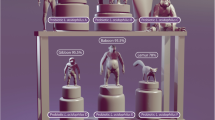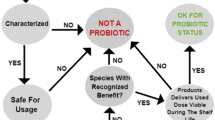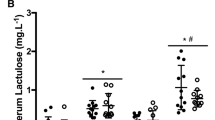Abstract
Purpose of Review
To provide a focused analysis of the challenges to gut health in athletes and examine recent research aimed at determining the impact of probiotics on preventing gastrointestinal (GI) symptoms and loss of barrier function in athletes.
Recent Findings
Frequency and severity of GI symptoms during training or competition were reduced by approximately one-third in studies demonstrating efficacy. Improvement of GI symptoms with probiotic supplementation was measured in both single-strain Lactobacillus and multi-strain Lactobacillus and Bifidobacterim probiotics, while improvement in gut barrier function was only measured for multi-strain probiotics. Likelihood of efficacy increased with duration of supplementation.
Summary
The greatest efficacy for reducing GI symptom frequency and severity, as well as improving or preserving gut barrier function during exercise training and competition, appears to be for multi-strain Lactobacillus and Bifidobacterium probiotic cocktails supplemented for at least 11 weeks.
Similar content being viewed by others
References
Papers of particular interest, published recently, have been highlighted as: • Of importance
Brouns F, Beckers E. Is the gut an athletic organ? Digestion, absorption and exercise. Sports Med. 1993;15(4):242–57. https://doi.org/10.2165/00007256-199315040-00003.
• Costa RJS, Snipe RMJ, Kitic CM, Gibson PR. Systematic review: exercise-induced gastrointestinal syndrome-implications for health and intestinal disease. Aliment Pharmacol Ther. 2017;46(3):246–65. https://doi.org/10.1111/apt.14157This systematic review provides extensive data to describe the etiology and implications of exercise-induced gastrointestinal symptoms.
de Oliveira EP, Burini RC, Jeukendrup A. Gastrointestinal complaints during exercise: prevalence, etiology, and nutritional recommendations. Sports Med (Auckland, NZ). 2014;44(Suppl 1):S79–85. https://doi.org/10.1007/s40279-014-0153-2.
van Wijck K, Lenaerts K, van Loon LJ, Peters WH, Buurman WA, Dejong CH. Exercise-induced splanchnic hypoperfusion results in gut dysfunction in healthy men. PLoS One. 2011;6(7):e22366. https://doi.org/10.1371/journal.pone.0022366.
• Jager R, Mohr AE, Carpenter KC, Kerksick CM, Purpura M, Moussa A, et al. International Society of Sports Nutrition Position Stand: Probiotics. J Int Soc Sports Nutr. 2019;16(1):62. https://doi.org/10.1186/s12970-019-0329-0This position stand provides a comprehensive review and evidence-based recommendations regarding the use of probiotics in athletes for a broad spectrum of applications including incidence and severity of respiratory tract infections, performance enhancement, and recovery from exercise.
Maughan RJ, Burke LM, Dvorak J, Larson-Meyer DE, Peeling P, Phillips SM, et al. IOC consensus statement: dietary supplements and the high-performance athlete. Int J Sport Nutr Exerc Metab. 2018;28(2):104–25. https://doi.org/10.1123/ijsnem.2018-0020.
Rawson ES, Miles MP, Larson-Meyer DE. Dietary supplements for health, adaptation, and recovery in athletes. Int J Sport Nutr Exerc Metab. 2018;28(2):188–99. https://doi.org/10.1123/ijsnem.2017-0340.
Möller GB, da Cunha Goulart MJV, Nicoletto BB, Alves FD, Schneider CD. Supplementation of probiotics and its effects on physically active individuals and athletes: systematic review. Int J Sport Nutr Exerc Metab. 2019;29(5):481–92. https://doi.org/10.1123/ijsnem.2018-0227.
Wosinska L, Cotter PD, O’Sullivan O, Guinane C. The potential impact of probiotics on the gut microbiome of athletes. Nutrients. 2019;11(10):2270. https://doi.org/10.3390/nu11102270.
Hill C, Guarner F, Reid G, Gibson GR, Merenstein DJ, Pot B, et al. Expert consensus document. The International Scientific Association for Probiotics and Prebiotics consensus statement on the scope and appropriate use of the term probiotic. Nat Rev Gastroenterol Hepatol. 2014;11(8):506–14. https://doi.org/10.1038/nrgastro.2014.66.
Miles MP, Wilson S, Yeoman CJ. Physical activity and inflammation phenotype conversion. J Clin Exerc Physiol. 2019;8(2):64–73.
Markowiak P, Slizewska K. Effects of probiotics, prebiotics, and synbiotics on human health. Nutrients. 2017;9(9). doi:https://doi.org/10.3390/nu9091021.
Larsen CN, Nielsen S, Kaestel P, Brockmann E, Bennedsen M, Christensen HR, et al. Dose-response study of probiotic bacteria Bifidobacterium animalis subsp lactis BB-12 and Lactobacillus paracasei subsp paracasei CRL-341 in healthy young adults. Eur J Clin Nutr. 2006;60(11):1284–93. https://doi.org/10.1038/sj.ejcn.1602450.
West NP, Pyne DB, Cripps AW, Hopkins WG, Eskesen DC, Jairath A, et al. Lactobacillus fermentum (PCC®) supplementation and gastrointestinal and respiratory-tract illness symptoms: a randomised control trial in athletes. Nutr J. 2011;10:30. https://doi.org/10.1186/1475-2891-10-30.
West NP, Pyne DB, Cripps AW, Christophersen CT, Conlon MA, Fricker PA. Gut balance, a synbiotic supplement, increases fecal Lactobacillus paracasei but has little effect on immunity in healthy physically active individuals. Gut Microbes. 2012;3(3):221–7. https://doi.org/10.4161/gmic.19579.
Sell J, Dolan B. Common gastrointestinal infections. Prim Care. 2018;45(3):519–32. https://doi.org/10.1016/j.pop.2018.05.008.
Kekkonen RA, Vasankari TJ, Vuorimaa T, Haahtela T, Julkunen I, Korpela R. The effect of probiotics on respiratory infections and gastrointestinal symptoms during training in marathon runners. Int J Sport Nutr Exerc Metab. 2007;17(4):352–63. https://doi.org/10.1123/ijsnem.17.4.352.
Gleeson M, Bishop NC, Oliveira M, Tauler P. Daily probiotic’s (Lactobacillus casei Shirota) reduction of infection incidence in athletes. Int J Sport Nutr Exerc Metab. 2011;21(1):55–64. https://doi.org/10.1123/ijsnem.21.1.55.
Salarkia N, Ghadamli L, Zaeri F, Sabaghian RL. Effects of probiotic yogurt on performance, respiratory and digestive systems of young adult female endurance swimmers: a randomized controlled trial. Med J Islam Repub Iran. 2013;27(3):141–6.
Haywood BA, Black KE, Baker D, McGarvey J, Healey P, Brown RC. Probiotic supplementation reduces the duration and incidence of infections but not severity in elite rugby union players. J Sci Med Sport. 2014;17(4):356–60. https://doi.org/10.1016/j.jsams.2013.08.004.
Roberts JD, Suckling CA, Peedle GY, Murphy JA, Dawkins TG, Roberts MG. An exploratory investigation of endotoxin levels in novice long distance triathletes, and the effects of a multi-strain probiotic/prebiotic, antioxidant intervention. Nutrients. 2016;8(11):733. https://doi.org/10.3390/nu8110733.
Pugh JN, Sparks AS, Doran DA, Fleming SC, Langan-Evans C, Kirk B, et al. Four weeks of probiotic supplementation reduces GI symptoms during a marathon race. Eur J Appl Physiol. 2019;119(7):1491–501. https://doi.org/10.1007/s00421-019-04136-3.
Pumpa KL, McKune AJ, Harnett J. A novel role of probiotics in improving host defence of elite rugby union athlete: a double blind randomised controlled trial. J Sci Med Sport. 2019;22(8):876–81. https://doi.org/10.1016/j.jsams.2019.03.013.
Shing CM, Peake JM, Lim CL, Briskey D, Walsh NP, Fortes MB, et al. Effects of probiotics supplementation on gastrointestinal permeability, inflammation and exercise performance in the heat. Eur J Appl Physiol. 2014;114(1):93–103. https://doi.org/10.1007/s00421-013-2748-y.
Lamprecht M, Bogner S, Schippinger G, Steinbauer K, Fankhauser F, Hallstroem S, et al. Probiotic supplementation affects markers of intestinal barrier, oxidation, and inflammation in trained men; a randomized, double-blinded, placebo-controlled trial. J Int Soc Sports Nutr. 2012;9(1):45. https://doi.org/10.1186/1550-2783-9-45.
Gill SK, Allerton DM, Ansley-Robson P, Hemmings K, Cox M, Costa RJ. Does short-term high dose probiotic supplementation containing Lactobacillus casei attenuate exertional-heat stress induced endotoxaemia and cytokinaemia? Int J Sport Nutr Exerc Metab. 2016;26(3):268–75. https://doi.org/10.1123/ijsnem.2015-0186.
Carbuhn AF, Reynolds SM, Campbell CW, Bradford LA, Deckert JA, Kreutzer A, et al. Effects of probiotic (Bifidobacterium longum 35624) supplementation on exercise performance, immune modulation, and cognitive outlook in division I female swimmers. Sports (Basel). 2018;6(4):116. https://doi.org/10.3390/sports6040116.
Jeukendrup AE. Nutrition for endurance sports: marathon, triathlon, and road cycling. J Sports Sci. 2011;29(Suppl 1):S91–9. https://doi.org/10.1080/02640414.2011.610348.
Armstrong LE, Lee EC, Armstrong EM. Interactions of gut microbiota, endotoxemia, immune function, and diet in exertional heatstroke. J Sports Med (Hindawi Publ Corp). 2018;2018:5724575. https://doi.org/10.1155/2018/5724575.
Marchbank T, Davison G, Oakes JR, Ghatei MA, Patterson M, Moyer MP, et al. The nutriceutical bovine colostrum truncates the increase in gut permeability caused by heavy exercise in athletes. Am J Physiol Gastrointest Liver Physiol. 2011;300(3):G477–G84. https://doi.org/10.1152/ajpgi.00281.2010.
Lambert GP, Lang J, Bull A, Pfeifer PC, Eckerson J, Moore G, et al. Fluid restriction during running increases GI permeability. Int J Sports Med. 2008;29(3):194–8. https://doi.org/10.1055/s-2007-965163.
Camus G, Poortmans J, Nys M, Deby-Dupont G, Duchateau J, Deby C, et al. Mild endotoxaemia and the inflammatory response induced by a marathon race. Clin Sci (Lond). 1997;92(4):415–22.
Lim CL, Pyne D, Horn P, Kalz A, Saunders P, Peake J, et al. The effects of increased endurance training load on biomarkers of heat intolerance during intense exercise in the heat. Appl Physiol Nutr Metab = Physiologie appliquee, nutrition et metabolisme. 2009;34(4):616–24. https://doi.org/10.1139/H09-021.
Jeukendrup AE, Vet-Joop K, Sturk A, Stegen J, Senden J, Saris WHM, et al. Relationship between gastro-intestinal complaints and endotoxaemia, cytokine release and the acute-phase reaction during and after a long-distance triathlon in highly trained men. Clin Sci. 2000;98(1):47–55. https://doi.org/10.1042/cs19990258.
Selkirk GA, McLellan TM, Wright HE, Rhind SG. Mild endotoxemia, NF-kappaB translocation, and cytokine increase during exertional heat stress in trained and untrained individuals. Am J Physiol Regul Integr Comp Physiol. 2008;295(2):R611–R23. https://doi.org/10.1152/ajpregu.00917.2007.
Brock-Utne JG, Gaffin SL, Wells MT, Gathiram P, Sohar E, James MF, et al. Endotoxaemia in exhausted runners after a long-distance race. S Afr Med J. 1988;73(9):533–6.
Guy JH, Vincent GE. Nutrition and supplementation considerations to limit endotoxemia when exercising in the heat. Sports (Basel). 2018;6(1):12. https://doi.org/10.3390/sports6010012.
Masood MI, Qadir MI, Shirazi JH, Khan IU. Beneficial effects of lactic acid bacteria on human beings. Crit Rev Microbiol. 2011;37(1):91–8. https://doi.org/10.3109/1040841X.2010.536522.
Ku S, Park MS, Ji GE, You HJ. Review on bifidobacterium bifidum BGN4: functionality and nutraceutical applications as a probiotic microorganism. Int J Mol Sci. 2016;17(9):1544. https://doi.org/10.3390/ijms17091544.
Gilliland SE, Speck ML. Antagonistic action of Lactobacillus acidophilus toward intestinal and foodborne pathogens in associative cultures (1). J Food Prot. 1977;40(12):820–3. https://doi.org/10.4315/0362-028X-40.12.820.
Sanders ME, Klaenhammer TR. Invited review: the scientific basis of Lactobacillus acidophilus NCFM functionality as a probiotic. J Dairy Sci. 2001;84(2):319–31. https://doi.org/10.3168/jds.S0022-0302(01)74481-5.
Azad MAK, Sarker M, Li T, Yin J. Probiotic species in the modulation of gut microbiota: an overview. Biomed Res Int. 2018;2018:9478630. https://doi.org/10.1155/2018/9478630.
Allen SJ, Jordan S, Storey M, Thornton CA, Gravenor MB, Garaiova I, et al. Probiotics in the prevention of eczema: a randomised controlled trial. Arch Dis Child. 2014;99(11):1014–9. https://doi.org/10.1136/archdischild-2013-305799.
Garaiova I, Muchová J, Nagyová Z, Wang D, Li JV, Országhová Z, et al. Probiotics and vitamin C for the prevention of respiratory tract infections in children attending preschool: a randomised controlled pilot study. Eur J Clin Nutr. 2015;69(3):373–9. https://doi.org/10.1038/ejcn.2014.174.
Allen SJ, Jordan S, Storey M, Thornton CA, Gravenor M, Garaiova I, et al. Dietary supplementation with lactobacilli and bifidobacteria is well tolerated and not associated with adverse events during late pregnancy and early infancy. J Nutr. 2010;140(3):483–8. https://doi.org/10.3945/jn.109.117093.
Author information
Authors and Affiliations
Corresponding author
Ethics declarations
Conflict of Interest
Dr. Miles does not have any potential conflicts of interest to disclose.
Human and Animal Rights and Informed Consent
This article does not contain any studies with human or animal subjects performed by any of the authors.
Additional information
Publisher’s Note
Springer Nature remains neutral with regard to jurisdictional claims in published maps and institutional affiliations.
This article is part of the Topical Collection on Sports Nutrition
Rights and permissions
About this article
Cite this article
Miles, M.P. Probiotics and Gut Health in Athletes. Curr Nutr Rep 9, 129–136 (2020). https://doi.org/10.1007/s13668-020-00316-2
Published:
Issue Date:
DOI: https://doi.org/10.1007/s13668-020-00316-2




